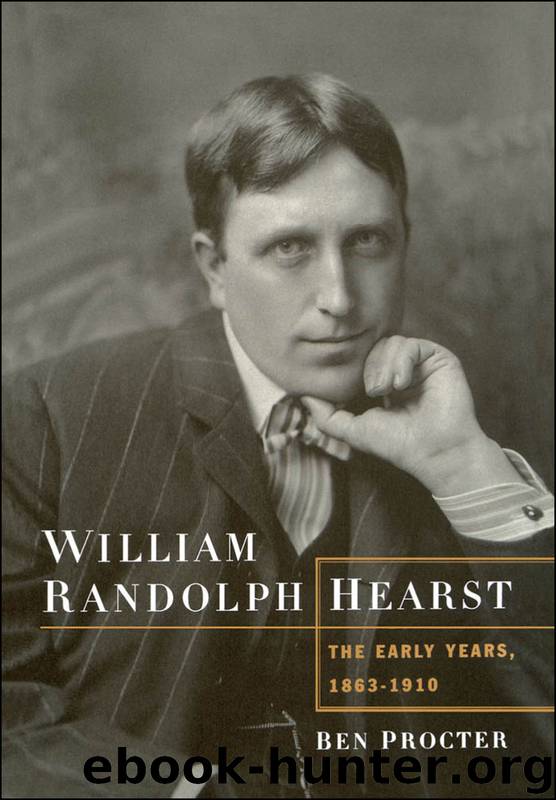William Randolph Hearst by Procter Ben;

Author:Procter, Ben;
Language: eng
Format: epub
Publisher: Oxford University Press, Incorporated
Published: 1998-09-26T16:00:00+00:00
Hearst once more was in his element, fascinating and entertaining the throngs of delegates in a desperate attempt to sell himself as a man of the people, as the only Democratic candidate with the money and organization necessary to win a national election.47
But the major participants had already decided the eventual outcome of this convention. Bryan, upon being asked to nominate Hearst, refused, thereby causing a bitterly disappointed Max Ihmsen, a New York Times reporter noted, to take “refuge in a large but somewhat acid smile.” Tammany chief Charles Francis Murphy, although despising Parker and his convention managers Hill and Belmont, would also have nothing to do with Hearst—the American and Evening Journal had not only been critical of recent Tammany dealings but also of its foremost celebrity and ally, New York City mayor George B. McClellan, Jr. Earlier in the year Murphy had been disdainfully outspoken, stating to one of former president Cleveland’s closest friends, Daniel S. Lament of New York, that Hearst “cuts no figure whatever.”
And as for the leader of the Parker campaign, David Bennett Hill, who ironically might have been Hearsts stepfather in 1895 if the gossipy “public cupids” had been accurate about Phoebe Hearst and him, the “radical” young publisher was anathema to him and conservative Democrats, a constant reminder of Bryanism and eight years of Republican rule in the White House. They therefore spread stories “painting him [Hearst] as an unrivaled voluptuary” with all the negative attributes of a Lothario or a Don Juan. One political cartoon pictured him on a yacht sailing and “cavorting along the Nile with a hundred Broadway nymphs.”
The Hill-Belmont faction, however, was much more concerned with convention strategy and momentum. Upon arrival in St. Louis, the Pennsylvania delegates, with sixty-eight votes, declared in favor of Parker; soon thereafter New Jersey and Virginia followed suit. No longer was the nomination in doubt, that is, unless some unforeseen incident occurred.48
Even so, Hearst played out his part in this unfolding convention drama without any sign of letup or defeat. While displaying “no heart for making a fight” concerning a credentials dispute in the Illinois delegation, he urged his followers to support specific planks, which were eventually included in the Democratic Platform—enlargement of the Interstate Commerce Commission, direct election of senators, jury trials in labor injunction cases, more stringent antitrust legislation, and lower tariffs. He also encouraged Max Ihmsen and Andy Lawrence to keep the boisterous Hearst battalions in full readiness for political combat, either to cheer for their “hero” or to demonstrate against the opposition. Then at midnight on August 8, 1904, their brief moment of triumph—as well as performance—occurred. After Delphin M. Delmas of San Francisco, a former ally of Senator George Hearst and reputedly one of the most renowned orators on the West Coast, spoke “eloquently” and at length in placing Hearst’s name in nomination for the presidency, they burst forth upon the convention hall with all the hoopla and ballyhoo at their command. For forty-three minutes they marched and
Download
This site does not store any files on its server. We only index and link to content provided by other sites. Please contact the content providers to delete copyright contents if any and email us, we'll remove relevant links or contents immediately.
Fanny Burney by Claire Harman(26240)
Empire of the Sikhs by Patwant Singh(22763)
Out of India by Michael Foss(16693)
Leonardo da Vinci by Walter Isaacson(12799)
Small Great Things by Jodi Picoult(6677)
The Six Wives Of Henry VIII (WOMEN IN HISTORY) by Fraser Antonia(5236)
The Wind in My Hair by Masih Alinejad(4839)
The Crown by Robert Lacey(4572)
The Lonely City by Olivia Laing(4568)
A Higher Loyalty: Truth, Lies, and Leadership by James Comey(4550)
The Iron Duke by The Iron Duke(4119)
Millionaire: The Philanderer, Gambler, and Duelist Who Invented Modern Finance by Janet Gleeson(4093)
Sticky Fingers by Joe Hagan(3911)
Papillon (English) by Henri Charrière(3902)
Joan of Arc by Mary Gordon(3782)
Alive: The Story of the Andes Survivors by Piers Paul Read(3730)
Stalin by Stephen Kotkin(3724)
Aleister Crowley: The Biography by Tobias Churton(3424)
Ants Among Elephants by Sujatha Gidla(3279)
